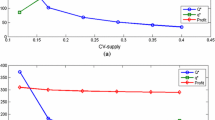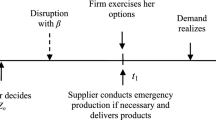Abstract
Supply uncertainty has been elevated to a strategic level concern in driving supply chain success. This paper considers that a firm faces a deterministic demand and procures from two unreliable suppliers: one is subject to a random disruption and might deliver all or nothing of the firm’s order, while the other one exposes to a random yield risk for the firm’s order. We explore the models of no recourse and ordering with recourse, and derive optimal solutions for each model. We provide the conditions under which single or dual sourcing strategy should be used. We also compare the decisions and profits among different models through computational experiments and find that it is more beneficial to order from the relatively expensive supplier as a backup source.











Similar content being viewed by others
References
Arreola-Risa, A., & De Croix, G. A. (1998). Inventory management under random disruptions and partial back-orders. Naval Research Logistics, 45, 687–703.
Babich, V. (2006). Vulnerable options in supply chains: effects of supplier competition. Naval Research Logistics, 53(7), 656–673.
Babich, V., Burnetas, A. N., & Ritchken, P. H. (2007). Competition and diversification effects in supply chains with supplier default risk. Manufacturing Service and Operations Management, 9(2), 123–146.
Bielecki, T., & Kumar, P. R. (1988). Optimality of zero-inventory policies for unreliablemanufacturing systems. Operations Research, 36, 532–541.
Chao, X., Gong, X., & Zheng, S. (2014). Optimal pricing and inventory policies with reliable and random-yield suppliers: Characterization and comparison. Annals of Operations Research. doi:10.1007/s10479-014-1547-0.
Chen, W., Feng, Q., & Seshadri, S. (2013). Sourcing from suppliers with random yield for price-dependent demand. Annals of Operations Research, 208, 557–579.
Chopra, S., Reinhardt, G., & Mohan, U. (2007). The importance of decoupling recurrent and disruption risks in a supply chain. Naval Research Logistics, 54(5), 544–555.
Dada, M., Petruzzi, N., & Schwarz, L. (2007). A newsvendors procurement problem when suppliers are unreliable. Manufacturing Service and Operations Management, 9, 9–32.
Federgruen, A., & Yang, N. (2009). Optimal supply diversification under general supply risks. Operations Research, 57, 1451–1468.
Grosfeld-Nir, A., & Gerchak, Y. (2004). Multiple lot-sizing in production to order with random yields: Review of recent advances. Annals of Operations Research, 126, 43–69.
Gupta, D., & Cooper, W. L. (2005). Stochastic comparisons in production yield management. Operations Research, 53, 377–384.
Keren, B. (2009). The single-period inventory problem: Extension to random yield from the perspective of the supply chain. Omega, 37, 801–810.
Li, X., Li, Y., & Cai, X. (2012). A note on the random yield from the perspective of the supply chain. Omega: The International Journal of Management Science, 40, 601–610.
Qin, F., & Rao, U. (2014). Role of random capacity risk and the retailer in decentralized supply chains with competing suppliers. Decision Sciences, 45(2), 255–279.
Sheffi, Y. (2005). The resilient enterprise: Overcoming vulnerability for competitive advantage. Massachusetts: The MIT Press.
Tang, S. Y., & Kouvelis, P. (2011). Supplier diversification strategies in the presence of yield uncertainty and retailer competition. Manufacturing and Service Operations Management, 13(4), 439–451.
Tomlin, B. (2006). On the value of mitigation and contingency strategies for managing supply-chain disruption risks. Management Science, 52(5), 639–657.
Wang, Y., Gilland, W., & Tomlin, B. (2010). Mitigating supply risk: Dual sourcing or process improvement? Manufacturing and Service Operations Management, 12, 489–510.
Acknowledgments
This work was supported by the National Natural Science Foundation of China (NSFC) Nos. 71002077 and 71372002, and the Fundamental Research Funds for the Central Universities No. NKZXB1228.
Author information
Authors and Affiliations
Corresponding author
Rights and permissions
About this article
Cite this article
Li, X. Optimal procurement strategies from suppliers with random yield and all-or-nothing risks. Ann Oper Res 257, 167–181 (2017). https://doi.org/10.1007/s10479-015-1923-4
Published:
Issue Date:
DOI: https://doi.org/10.1007/s10479-015-1923-4




